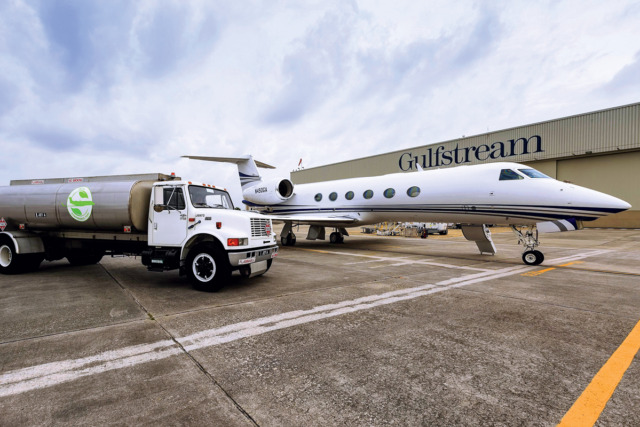
Today, the transportation and airline industries are the largest direct and indirect emitters of greenhouse gasses (GHGs) as a result of burning fossil-based fuels: gasoline, diesel, and jet fuel. These fuels produce carbon pollutants in the form of CO2 – widely thought to have an impact on climate change.
More than 26 billion gallons of jet fuel are consumed in the U.S. annually. When combusted in the sky, they emit approximately 260 million tons of CO2. The business aviation sector contributes roughly 10% of these emissions – approximately the same amount of sulfur dioxide produced annually from all the burning of coal and other fossil fuels.
According to the joint General Aviation Manufacturers Association and International Business Aviation Council commitment made in support of the International Civil Aviation Organization’s proposed targets for lowering GHG emissions as part of the 1997 Kyoto Protocol on climate change, the business aviation sector set forth three goals to reduce GHGs:
- A 2% improvement in fuel-efficiency per year from 2010 until 2020
- Carbon-neutral growth from 2020 onwards, and
- A 50% reduction in carbon emissions by 2050, relative to 2005.
It’s not enough. We can do more right now to reduce GHG emissions, such as developing more fuel-efficient engines and airframes, spending less time idling on the tarmac, and using Sustainable Alternative Jet Fuel (SAJF).
Produced from renewable resources, such as feedstocks like corn starch, sugarcane juice, crop residues, purpose-grown grass crops, and woody plants, SAJF is a direct substitute for fossil-derived jet fuel. It meets the standards of the American Society for Testing and Materials (ASTM) and has been tested by engine and aircraft manufacturers to ensure safety and reliability. SAJF burns cleaner than traditional jet fuel, with few to no particulates and no sulfur. In some instances, SAJF can have higher energy density than fossil jet fuel – meaning you can fly further on that same volume of fuel, lowering your per hour operating costs. Finally, SAJF can be blended with fossil jet fuel to increase the latter’s efficiency.
SAJF can reduce CO2 emissions by up to 70%, depending upon the renewable feedstocks used and the renewable energy deployed to produce it. According to the Business Aviation Guide to the Use of Sustainable Alternative Jet Fuel (May 2018) the “single largest potential reduction in aviation’s GHG emissions,” and the key to reaching industry goals, “will come through the use of SAJF.”
Further, policies such as the California Low Carbon Fuel Standard (LCFS), which has adopted SAJF as a low-carbon fuel, will provide producers with an incentive to supply SAJF, as producers of fossil fuels will be obligated to comply with such low carbon fuel standards. Companies like Gevo, World Energy, and Neste currently are producing SAJF for use on both business aircraft and commercial airlines.
SAJF today retails at a premium well above traditional fossil-based Jet-A, due primarily to the limited volume currently produced and distributed. Once SAJF production ramps up to meet the projected demand, and when government incentives take effect, your retail price should drop significantly.
Bombardier Business Aircraft, Embraer Executive Jets, and Gulfstream Aerospace have been involved in the SAJF testing and certification process in their respective product lines, and fully support the reduction initiative. Having flown more than 700,000 miles using SAFJ in various models, Gulfstream is now offering it for sale at its Long Beach, California Service Center.
Suppliers such as AvFuel and World Fuel now have access to SAJF, so whether you own your aircraft, operate a Fixed Base Operation (FBO), or manage a corporate aviation program, ask your supplier if it’s available yet in your area. You can fly more efficiently, while supporting the business aviation industry’s initiative to reduce GHGs. BAA
Click here to download The Business Aviation Guide To the Use of Sustainable Alternative Jet Fuel (SAJF)
Timothy Cesarek is EVP and Chief Commercial Officer of Gevo, a renewable chemicals and advanced biofuels company. His 30+ years in business development and private equity includes 15 years in renewable fuels, chemicals, and energy.




